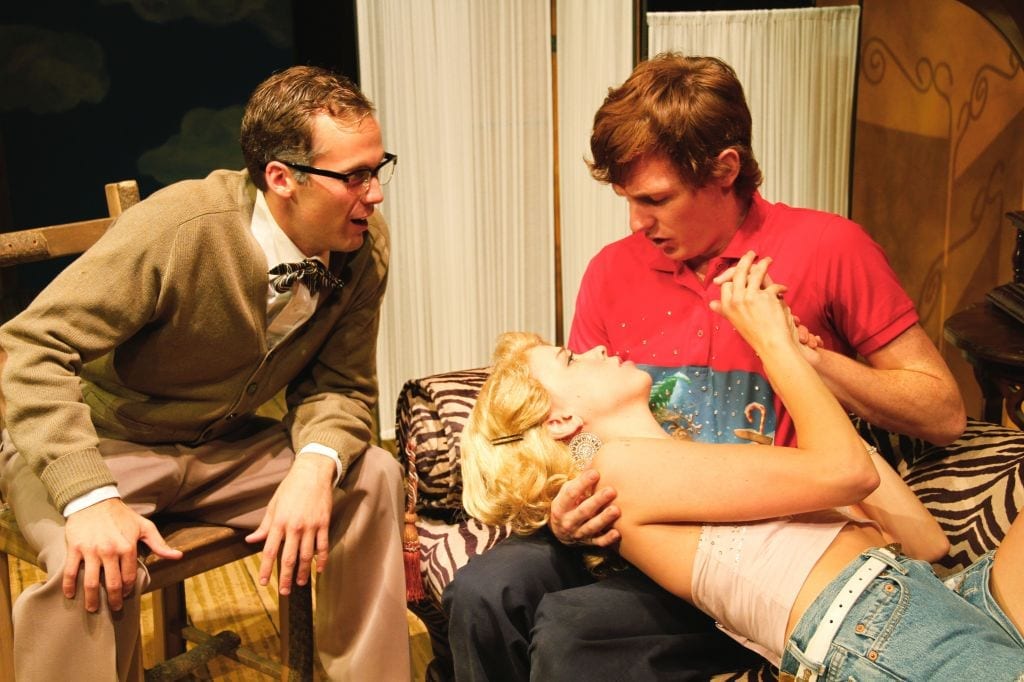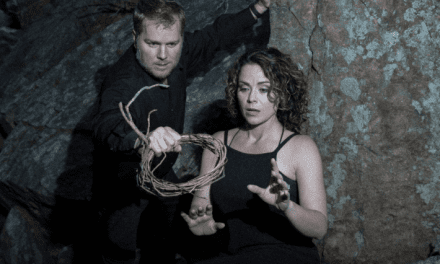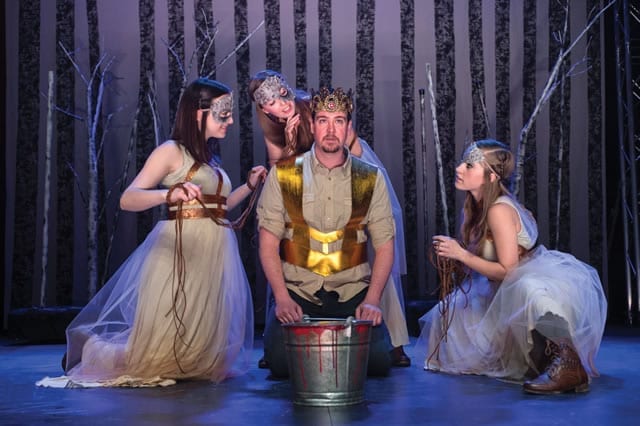SALT LAKE CITY — When I picked up my tickets to the University of Utah’s production of Vernon God Little, I had no idea what to expect. I had read the description about the play on the University’s website and learned that it was supposed to be a satirical look at aftermath of violence and the American media. I wasn’t sure how that was going to work, but I was willing to find out.

Show closes September 30, 2012.
When I took my seat, a pre-show was already in progress and appeared to be characters from the show participating in a karaoke night at the local kitschy-yet-sketchy barbecue joint/bar, complete with neon beer signs and two TV screens facing the audience streaming song lyrics. I wasn’t sure how that tied in to the play, but again I was willing to find out. I was immediately struck by the jovial tone that the country-western tunes being belted by the cast presented. This, set up against the layered set by Kevin S. Dudley and slightly incongruous and exaggerated costumes by Tamara Haller, created a cartoonish picture of small town Texas, USA. Big hair and big voices abounded and as the pre-show ended and the action began, I was a little afraid that the satire was going to be lost in the overblown creation of stereotypes. Unfortunately, I was right.
Vernon God Little is based on the 2003 Booker Prize winning book by DBC Pierre, an English author, and is meant to be (as the Booker Prize judges described it) “a coruscating black comedy reflecting our alarm but also our fascination with America.” The stage adaptation by Tanya Ronder includes characters singing popular “cowboy” music to add to the parody of American reaction after something tragic. The story centers around Vernon (a frenetic Jaten Lee McGriff), a hapless and cynical teen, facing life in his tiny community after his best friend Jesus Navarro has killed 16 classmates and then himself. The silent specter of Jesus follows Vernon as he attempts to evade guilt by association readily and easily assigned to him by everyone from the Sheriff to his mother.

Jaten Lee McGriff as Vernon and Krista Niederjohn as Ella in Vernon God Little. Photo by Michele Collins.
As the tragedy of the shooting becomes a media frenzy, numerous characters are introduced that are ready and willing to exploit and use Vernon and the event for their own personal gain. However true some of the commentary may have originally been, something was definitely lost in the adaptation or the creation of a piece of theatre. Let me differentiate between the quality of the performance and production quality and content.
The actors, all seniors from the Theatre Department’s Actor Training Program, attack the material with tenacity and zeal. Despite this, there is a lack of grounding and honesty that would provide authenticity to the unrestrained mockery of the characters they are interpreting. The 15 actors portray 50 characters over the 2 ½ hour run time. This is no mean feat, but there is not a moment of truth or of sympathy in the entire evening. Rather, the characters are the grossest and most disturbing stereotypes of human behavior: a drug addled party girl who is Vernon’s dream girl, a skeezy TV repairman bent on sleeping and conning his way to media mogul-dom, the most desperate of the “Real Housewives” set with false smiles and intentions (including Vernon’s own mother who won’t listen to him, but will proclaim on television that “even murders are loved by their families”). Vernon is surrounded by broken, damaged people with no apparent concept of consequences. Vernon’s eventual escape to Mexico seems like the only sane thing to do, but rather than fleeing from the pain and survivor’s guilt, he seems to be on spring break.
Again, the energy of the performers cannot be faulted, and some even bring a certain charm to the deranged characters the present. This is particularly evident with Eva Terranova’s Deputy Vaine, a woman obviously trying to prove herself in a “man’s job.” When Vaine is faced with a TV interview, Terranova stutters and stumbles with something close to likability. Krista Niederjohn as Ella, an unbalanced Lolita so desperate for Vernon’s affection she is willing to be “pimped out” by him, is painfully unaware of her victim-hood and approaches her “romantic” relationship with Vernon with the wide-eyed wonderment of a traditional ingenue. Emalie Ellis Ferguson plays Vernon’s mom, a Scarlett O’Hara type prone to over-the-top crying jags unable to disentangle herself from a pattern that draws her to men who use her. Ferguson has her moments of pure vulnerability that are refreshing, but too quickly evaporate. She has excellent timing and probably the most challenging female role of the play, I just wish her moments connecting with Vernon lasted as long as some of her swoons. Another stand out is Andy Ricci who plays six distinct and (regrettably) vaguely ethnic characters. Ricci is obviously a talented comic actor, but his ethnic stereotypes appeared uniformed and bordered perilously close to the blatant racism of bygone minstrel shows.

Drew Baker as Dr. Goosens, Jaten Lee McGriff as Vernon, and Ana Lemke as Taylor in Vernon God Little. Photo by Michele Collins.
Ethnic stereotypes were not the only ones disturbingly presented, but they were the most egregious. There seemed to be a maniacal glee in showing the audience the full gamut of horror people can inflict on each other. Pedophilia, bullying, sexual abuse and school shootings are serious themes and must be carefully addressed. The insensitivity with which they were directorially dealt with was offensive at best and unconscionable considering the recent shootings in Colorado and Wisconsin. The show contains it fair share of adult content, which normally doesn’t bother me. The language is “Rated R,” yet mild compared to the two sexual situations which are unnecessarily graphic and treated with seeming delight at being so. Vernon is literally violated by an adult the court has appointed to help him. This is done with such needless and purposive comic build up that I was uncomfortable for the rest of the show. I refuse to blame the student actors and designers for this. They were merely doing what the director directed them to do, yet I kept wondering how director Matthew Toronto allowed things to get so out of hand. Whatever his vision aimed for, it seemed too lurid and exploitative for the intended satire of the script.
Further confusing the story were instances of the cast breaking out into song during scenes or transitions. I suppose these events were meant as burlesque ways to soften the content, but often they overshadowed the dialogue exchanges they were meant to underscore. The only instance where a song seemed appropriate and at all relevant to the story was near the end of the play and Vernon’s apparent demise when Ferguson and Jordan Novotny performed a lovely a cappella version of “I’ll Fly Away” in a moment of near-grief. The cast all have well-trained voices, but the numbers felt disconnected and out of place. Lyrics for these musical interludes were projected above the action on TV screens that also showed images of locations as the story rapidly changed scenes.
Both time and place were difficult to follow, but Dudley with his surprisingly versatile set and Ethan Olsen through his minimalistic lighting did their best to delineate the rapid changes. The first act was full of chaotic energy and introduced vast numbers of characters for Vernon to interact with, but did little to move along Vernon’s story. The second act delved into the meat of his journey, but dragged in pacing. The end of Vernon’s story provided no catharsis and no one seemed to have learned anything. This was perhaps the most disappointing part. Director Matthew Toronto entitled his director’s note “Too Little, Too Late” and stated that Vernon’s story and its “unflinching honesty” urges the audience to “examine our response to tragedy.” Sadly, I saw very little in this play that addressed tragedy and only a maudlin celebration of the most reprehensible of human behavior.
It’s important to note that the rest of the audience seemed to be in stark disagreement with me. Aside from a handful of walk outs at intermission, my fiancée and I seemed the only horrified audience members. I’m not sure if they were seeing the commentary intended by the playwright or reveling in the “out of the box” viewing experience, but others were apparently enjoying themselves. Personally, I was on the side of the walk outs.

The cast of the University of Utah production of Vernon God Little. Photo by Michele Collins.






